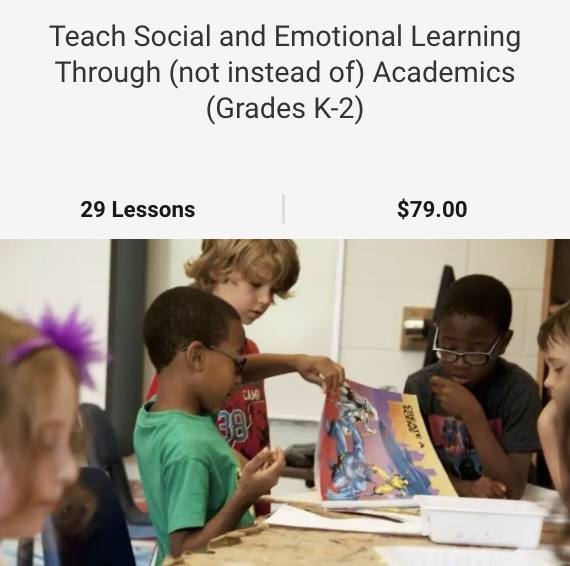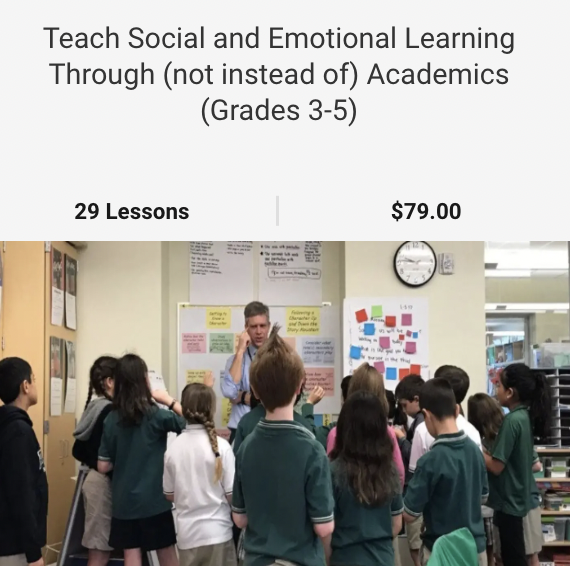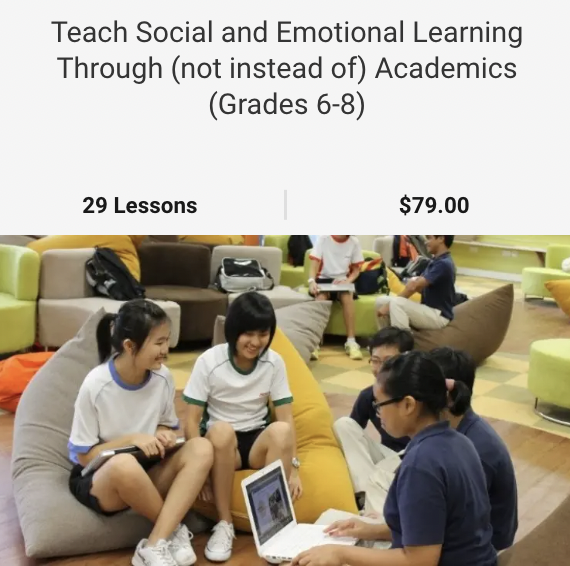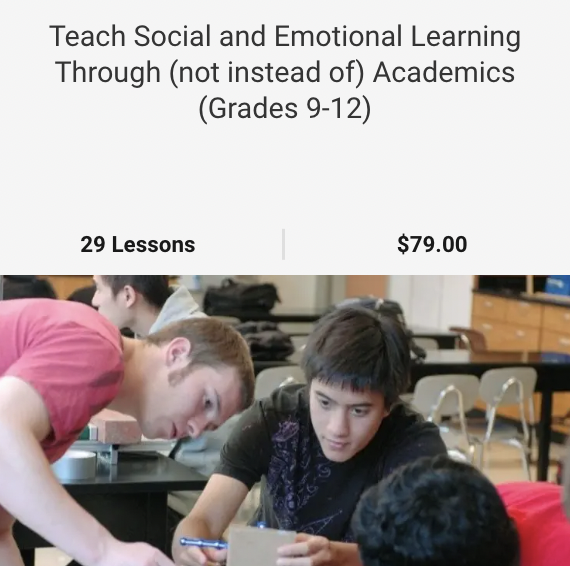Are You Teaching SEL or Character Ed?
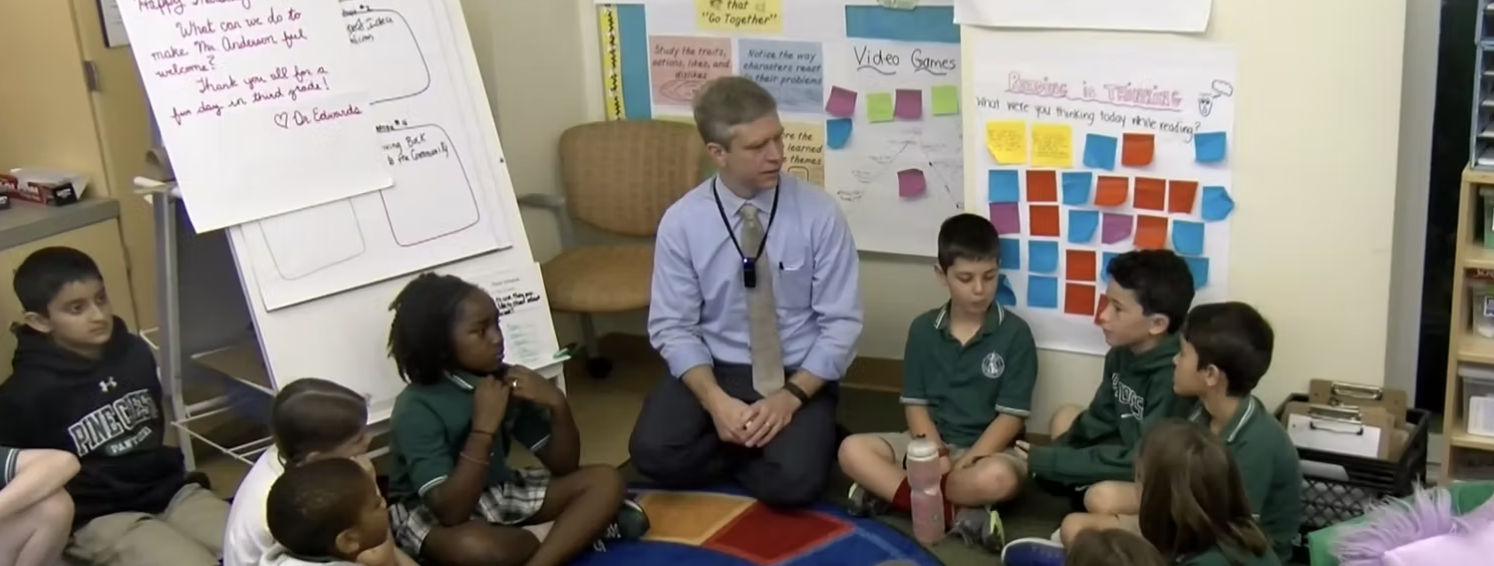
This is probably a bit of a misleading title since there are plenty of overlaps between teaching SEL and character ed. If we put these two terms into a Venn diagram, we’d find plenty of overlaps. In my mind, there’s one key difference between the two, and it’s that difference that we’ll explore in this post.
What is Character Education?
When schools focus their SEL work on character education, traits such as growth mindset, honesty, compassion, responsibility, and empathy are taught as their own content. Teachers devote specific lessons to these traits, often carving out time from the academic day to read books, facilitate conversations, and lead class discussions. While many of these lessons might involve academic skills (listening comprehension, speaking & listening, etc.), the primary focus is on teaching students about the character ed traits.
Social and Emotional Learning
When schools focus on teaching students SEL skills through (not instead of) academic work, the academics are the starting place. Teachers examine upcoming academic lessons and activities and consider which SEL skills might be necessary for students to be successful academically. The teaching of these SEL skills is then woven into the academic teaching itself. Traits such as a growth mindset, persistence, and empathy are seen as part of the academic teaching of the day.
Which is Better?
Between these two (again—not entirely dissimilar approaches) I favor teaching SEL as a part of daily academic work. I certainly don’t have anything against character education lessons and activities designed to help students learn how to work well with others or develop more habits of positive thinking. However, I do think that when a school focuses its efforts on character education, there are problems that can crop up.
For example, we might We may end up basing our teaching of SEL skills on a scope and sequence that doesn’t match what our students need in the moment. Or, we might not know where to go for materials and may rely on scripted programs or Teachers-Pay-Teachers activities that lack depth.
The biggest problem, though, is time. We have a lot of academic content to help our students learn. When we block off a specific time of the day to teach responsibility, empathy, or effective decision-making as its own thing, that’s one more block of time we’re not focused on the regular academic work. I’ve heard the argument made that this is time well-spent since kids can’t be successful academically without these skills, and I agree. So, let’s keep the teaching of SEL focused, whenever possible, on the actual skills and strategies students need to be successful with their regular academic work.
An Example in Action
A few years ago, I got to teach a reading lesson as a guest teacher to a group of third graders. A team of teacher leaders, all focused on teaching SEL through academics, observed the lesson, and then we debriefed afterwards.
Here was how I planned and facilitated the lesson. First, I mapped out the flow of the lesson.
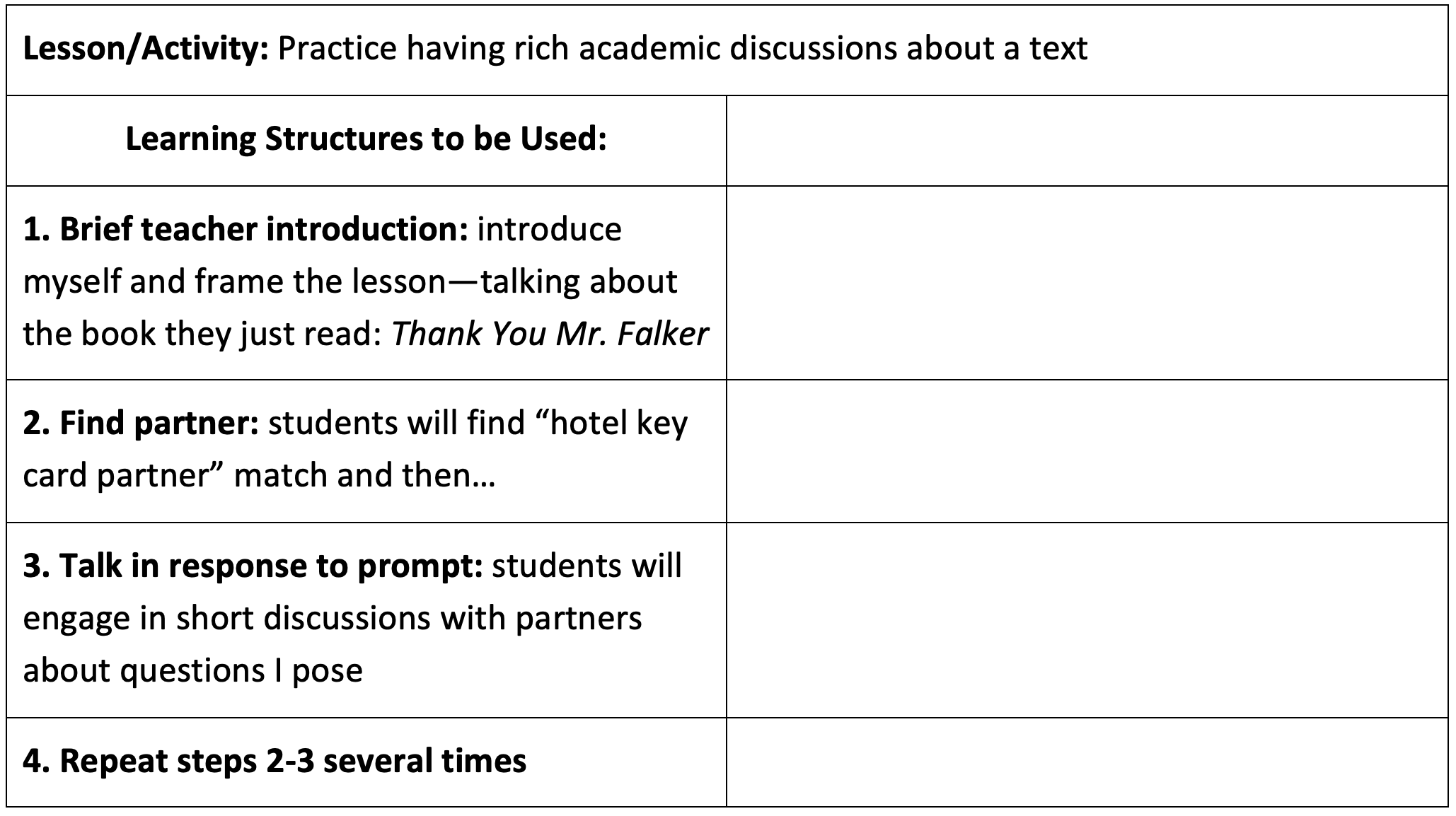
Next, I thought of a few SEL skills students might need to be successful with the lesson.
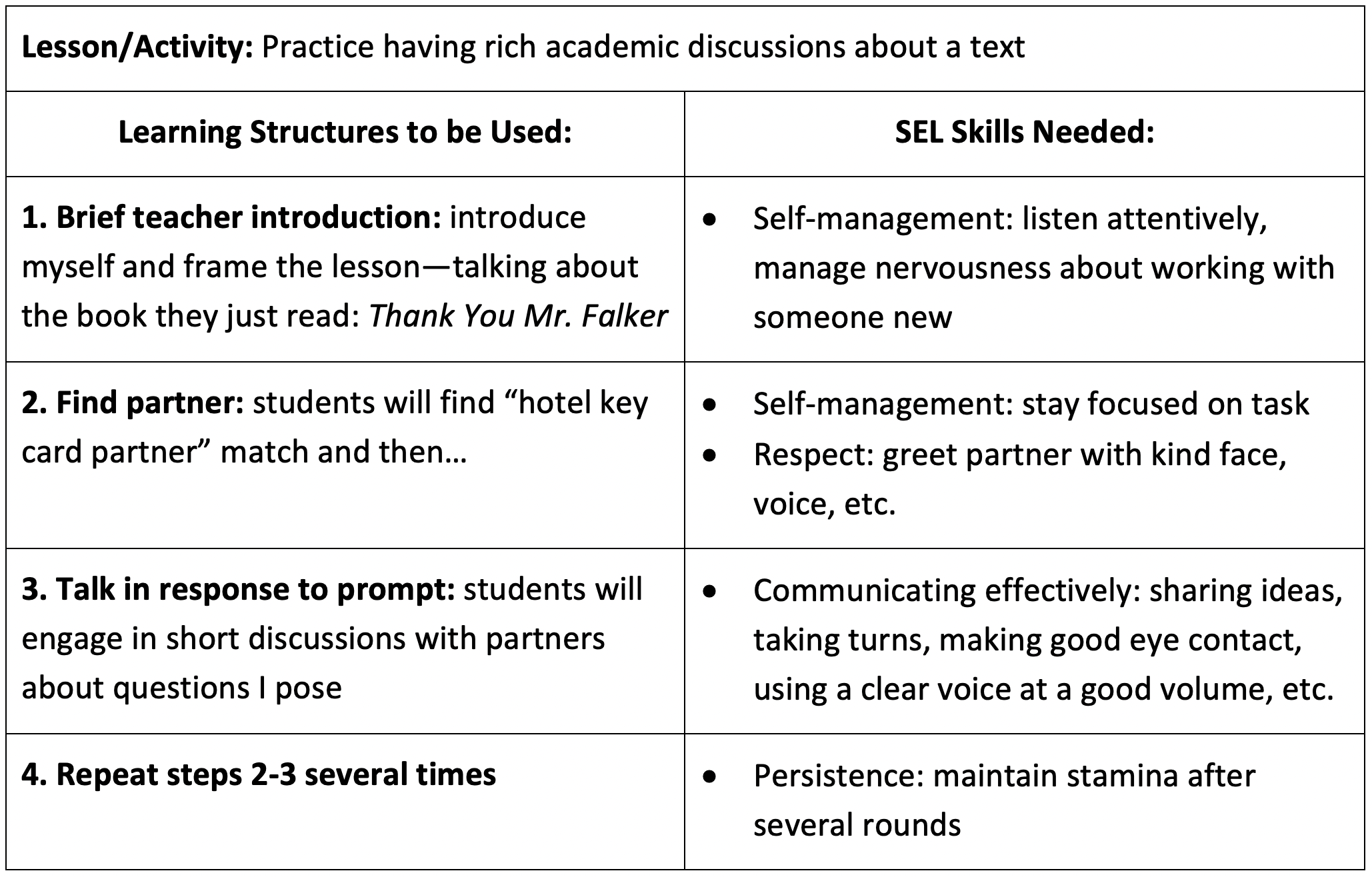
I touched base with the students’ regular teacher, and she let me know that they could sometimes be disrespectful with each other when working in groups. So, I decided to do a little SEL teaching to set them up for success with that part of the lesson. (In the above chart, that’s in step 2.) I elicited ideas from them about how to have nice partner chats.
Then, as the academic lesson progressed, I kept bringing students back to the SEL goal—about having nice partner chats. I reinforced some of the things students did well and pushed them on a couple of other points. (You’ll even see me do a little teaching about a management strategy—using the hand signal to get the attention of the group.) If you watch the video below, you’ll see how the reading lesson—with the academic goal of having deep conversations about a book—is enhanced through this SEL coaching. Students are better able to engage in their academic work because of the emphasis on SEL skills. In fact, the academic and SEL teaching and learning are intertwined throughout the reading lesson.
Other Examples
Of course, this same structure can be used in any content at any grade level. For example, you might…
- Help 7th grade mathematicians consider strategies for managing frustration when they get stuck on a tough problem
- Teach high school juniors how to manage a complex research project through breaking it down into smaller parts
- Model how to keep your body in control when playing an active full-body counting or phonemic awareness game with kindergarteners
- Teacher middle school band members strategies for listening to each other and adjusting their volume to match the group
The Importance of Academics Driving SEL Teaching
In these last examples, we see another challenge with focusing on a character education approach to SEL development. When the focus begins with character traits and that’s what drives teaching, these skills may or may not line up with what students need in any given moment. Especially when teachers are given the idea that the school is “doing” SEL through their character ed program, they may consider this box checked. (We “do” SEL on Wednesday afternoons, so I can just focus on science during science class.)
So, instead, let’s keep our main focus and attention on the academic work of the classroom–always with an eye toward which social skills and which emotional skills students will need in order to be successful! Then we don’t need to take time away from academics to teach SEL. Instead, we can teach SEL through academics!
If you’re interested in exploring this idea in more depth, I have created online courses for educators about how to teach SEL through academics. If you’re a school/district leader, reach out to me (mike@leadinggreatlearning.com) to request a preview courses or to inquire about group rates.
Author
-
Mike Anderson has been an educator for many years. A public school teacher for 15 years, he has also taught preschool, coached swim teams, and taught university graduate level classes. He now works as a consultant providing professional learning for teachers throughout the US and beyond. In 2004, Mike was awarded a national Milken Educator Award, and in 2005 he was a finalist for NH Teacher of the Year. In 2020, he was awarded the Outstanding Educational Leader Award by NHASCD for his work as a consultant. A best-selling author, Mike has written ten books about great teaching and learning. His latest book is Rekindle Your Professional Fire: Powerful Habits for Becoming a More Well-Balanced Teacher. When not working, Mike can be found hanging with his family, tending his perennial gardens, and searching for new running routes around his home in Durham, NH.
- Share:
You may also like

The Perfect Breakfast for Teachers
- February 11, 2025
- by Mike Anderson
- in Blog

Finding Time for a One-on-One Problem-Solving Conference


